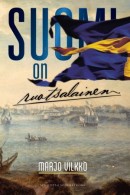Marjo Vilkko: Suomi on ruotsalainen [Finland is Swedish]
16 January 2015 | Mini reviews, Reviews
 Suomi on ruotsalainen
Suomi on ruotsalainen
[Finland is Swedish]
Helsinki: Schildts & Söderströms, 2014. 321 pp.
ISBN 978-951-52-3419-3
€36, hardback
Finland was a part of the Swedish kingdom from the deep Middle Ages until 1809, when for a hundred years it was incorporated into Russia. The Swedish period left profound traces in Finnish society, and these were examined – with lively discussion – in the television series Finland is Swedish. Now the series scriptwriter and editor Marjo Vilkko has provided a more thoroughgoing treatment of the topic in her book. Although Finland is a country that shares Western and Nordic values, it differs from Sweden in several respects. For historical reasons and due to the presence of a significant Swedish-speaking minority, Swedish is still an official language; many things have moved from Europe to Finland via Sweden. However, at times the differences in Finland’s development have been emphasised by those wishing to propagate ‘original Finnish’ characteristics. With the use of fascinating examples and reflections drawn from history, Vilkko shows, for example, how Finland’s local government, legal system and Lutheran religion are to a large extent an inheritance from the Swedish period, with a continuous mutual interaction. The book moderately propagates the recognition of a common heritage and support for mutual understanding.
Translated by David McDuff
Tags: Finnish society, history, identity, politics
1 comment:

6 July 2018 on 11:31 pm
An open letter to Marjo Vilkko
The book ”Finland is Swedish” is highly interesting reading for several reasons. What is particularly fascinating about it is that it tends to allow for a number of speculative questions to debate on.
Finland is a very young nation both historically and politically. It gained independance after a number of incidenses such as the war between Sweden and Russia in 1808-1809, murder of governor general Bobrikov, a civil war and a trade off with Lenin grasping power in Russia. The indipendance was once more threatened in 1939 when Russia wanted to annex the Finnish territory.
May I present a number of speculative questions to Marjo Vilkko as she has a profound understanding of the past. The underlying interest is to understand is what might have happened if the history would have taken another turn in some point of time?
1
What would happened if Sweden would not have lost the war against Russia? It is suggested that the loss was a result of neglect from the political (and military?) leaders in Sweden. Could Sweden over the time have continued its dominion over Finland considering its very different culture and growing urge for independency? Could Finland have negotiated for its independency? Would it have become a committed member of a Nordic alliance?
2
What was Finland’s role while annexed to Sweden? How strongly was this Eastern province tied up with Sweden considering the cultural differences?
3
How important was the period under Russian dominion? Was this a significant factor in a chain of happenings leading to the independency for Finland?
4
Was the result of the civil war a proclamation for maintaining Nordic values or was it a result of indecisive Russian interest?
Your book discusses to some extent the fact that there still is a degree of aggression among Finns against Sweden and the Swedes. Looking back should we instead be greatful for their contribution and should we consider that the only mistake they made was to loose the war in 1809? If we take this view can we find a more appreciative approach towards Sweden, Finns with Swedish as theit mother tongue and the Swedish language and culture overall?
Your kind and experienced point of view over the above topics would be most valuable to understand. Thank you very much for your consideration and effort.
Kind regards,
Thomas Tapio
thomas.tapio@gmail.com
http://Www.linkedin.com/thomas.tapio